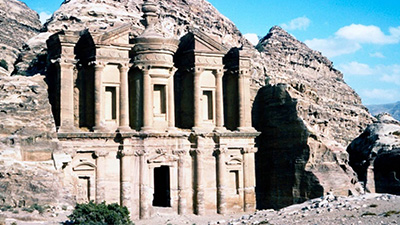Early Humans
Teacher Resources
Driving Question: What caused some humans to shift from foraging to farming and what were the effects of this change?
For hundreds of thousands of years, our species lived as foragers. Then, about 12,000 years ago, some foragers started to experiment with farming, kicking off the Neolithic Revolution and setting the stage for huge transformations.
Learning Objective
- Evaluate the positive and negative effects of the transition to agriculture.
Opener: Early Humans
To teach this lesson step, refer to page 2 of the Lesson 0.0 Teaching Guide.
Early humans lived very different lives from us—how did that impact what they ate?
The Earliest Humans
To teach this lesson step, refer to page 2 of the Lesson 0.0 Teaching Guide.
Humans tend to stick with what works. That was most certainly true of our ancestors, who, for a long time, were foragers. But as some groups started farming, things started to change very quickly.
-
Guiding Questions
-
Before you watch
Preview the questions below, and then review the transcript.
While you watch
Look for answers to these questions:
- How did young people in the Paleolithic Southwest spend their free time?
- What does Paleolithic mean?
- What does Neolithic mean?
- What were the big changes in human societies that started farming? What changes were specific to the Sinagua?
- Why did Sinagua youths stop making figurines?
After you watch
Respond to this question: According to evidence in this video, was farming was positive or negative for human societies?
Causes of Farming
To teach this lesson step, refer to page 3 of the Lesson 0.0 Teaching Guide.
The shift to farming was an important change, and not without consequences. In this article and activity, you’ll examine the bumpy road from foraging to farming.
-
Guiding Questions
-
Before you read
Preview the questions below, and then skim the article. Be sure to look at the section headings and any images.
While you read
Look for answers to these questions:
- What is one theory that could show that farming began unintentionally?
- How did the rise of fixed farming communities change what people’s daily work looked like?
- How did the rise of villages both expand and shrink networks?
- What were the benefits and drawbacks of foraging as a system of production and distribution?
- What were the benefits and drawbacks of farming as a system of production and distribution?
After you read
Respond to this question: Given the evidence in this article, would you have preferred to have been a farmer or a forager?
Agricultural Governments
To teach this lesson step, refer to page 4 of the Lesson 0.0 Teaching Guide.
Historians suggest that the advent of farming led to the creation of states. You’ll examine the seeds of this argument in this video on farming and the state.
-
Guiding Questions
-
Before you watch
Preview the questions below, and then review the transcript.
While you watch
Look for answers to these questions:
- What do Candice Goucher and Laura Mitchell think about the argument that farming was a precondition for the state?
- What evidence do Goucher and Trevor Getz provide as a counterargument to the claim that grain farming, in particular, led to states?
- What does Mitchell say about the connection between labor and the state?
- Given the added labor and tax burden, do Goucher and Mitchell think the state was a good idea?
- According to Goucher, is there still a connection between farming and the state today?
After you watch
Respond to these questions: Do you think some foraging communities could also be called states? What conditions might foragers need in order to develop things like specialization of labor or social hierarchies?
Closer: Early Humans
To teach this lesson step, refer to page 5 of the Lesson 0.0 Teaching Guide.
History is filled with choices: isolationism vs. internationalism, modernists vs. traditionalists, war vs. peace. You’ll face a choice of your own in this activity: foraging or farming?



